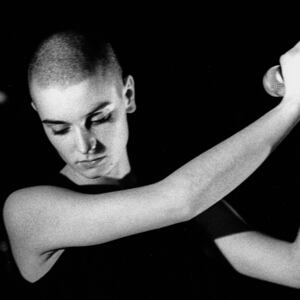The mid-1980s were a contentious time for hip-hop and nobody wanted to admit it. Nobody, meaning anyone tangentially connected to the corporate side of mainstream art. And by corporate, meaning monetizing. Oh, and by mainstream, meaning white.
That’s because the musical embodiment of hip-hop culture—rap music—was finally leaving its block and gearing up to take over the world. The pioneers were inching toward new levels like radio (thanks to Mr. Magic’s “Rap Attack”) and film (thanks to Harry Belafonte’s Beat Street, among others). Add to that the formation of Def Jam and Tommy Boy Records and we started to witness rappers fully becoming a viable part of the music industry.
It was terrifying to those who thought they could contain it. And they tried, really hard. Rap was endearing when it was cheeky, as evidenced in 1986 when Run-DMC and Aerosmith collaborated on the single “Walk This Way.” The two groups showed the yin and yang effect of how the mainstream detested both rap music and glam rock music, as they’re both “making noise” in rooms next to each other, only to “break down the wall” and work together. Everyone loved that symbolism, that “unapologetic unity” even as the Grammy committee was slowly piecing together its plan to acknowledge how rappers sold records—but not have the rest of the world see it on their TV screens. Ironic.
Then along came Sinéad O’Connor.
Born in Dublin, Ireland, Sinéad was cut from a different kind of cloth. She sang in a band called Ton Ton Macoute before flying solo and landing in the ears of Americans, thanks to her college radio hit “Mandinka.” O’Connor cited inspirations ranging from Bob Dylan and David Bowie to Bob Marley, though like many, she was made aware of the hip-hop explosion happening in the States and was drawn to it. Some would say that O’Connor harbored a “punk” attitude, and hip-hop was as punk as you could get, so the allure made sense. Her 1987 debut album The Lion and the Cobra was a commercial success, earning her a Grammy nomination for Best Female Rock Vocal Performance in 1989. Many regard that album as a “breaking free” of sorts. For Sinéad it was against the patriarchy and the Roman Catholic Church (at times, synonymous), though anyone could feel the depth of that rebellion and apply it to their lives. When O’Connor arrived Stateside, she found a space to openly rebel, and to put it bluntly, fight the power. She found that avenue through hip-hop as one of its biggest allies at a time when the odds were stacked against it.
There have been other instances where white artists have attempted to use their podium for the greater good of this Black art form. Blondie’s Debbie Harry shouted out Fab Five Freddy during her little rapping ditty on the 1980 Blondie hit “Rapture,” though it backfired once music history revisionists attempted to credit Blondie with the first commercial rap hit, usurping the throne of The Sugarhill Gang’s “Rapper’s Delight,” though some will still argue that Blondie had the first rap music video. To be fair, Debbie Harry does not agree. In 1981, she circled back and requested the Funky 4 + 1 as musical guests when she hosted Saturday Night Live—though SNL agreed and then only televised the group’s performance as the credits rolled at the end of the episode. Suffice to say, getting hip-hop its well-deserved visibility in the ’80s was an uphill battle.
For O’Connor, it became a different kind of mission, one rooted in a deep understanding of what it’s like to be silenced and then openly criticized for the desire to speak up. This was an all-encompassing mission, though hip-hop played a major part of it. She did so in minor ways before quickly moving them to major.
In 1988, when her record label wanted her to give her Grammy-nominated debut album a jolt with a new song, she added rapper MC Lyte on the remix to her single “I Want Your Hands (On Me).” The single was offered as both a Dance and Street version, and while the aforementioned Aerosmith/Run-DMC collaboration was regarded as a “mash-up,” the Lyte collab was a bold, revolutionary, yet completely seamless joining of forces. It changed the game for women in hip-hop moving forward, offering new possibilities in sound and commercial experimentation.
Sinéad doubled down on her support for hip-hop a year later during the 31st Grammy Awards, where she was nominated in the aforementioned Best Female Rock Vocal Performance category and was also asked to perform. Meanwhile, hip-hop was fighting for its life at the ceremony. The genre had become far too big to contain, yet the Grammys found a way to do it, simply by not televising the first Grammy in history for Best Rap Performance. Further, they opted to make DJ Jazzy Jeff & The Fresh Prince the victors, with their commercial rap hit “Parents Just Don’t Understand,” clearly shunning less commercial rap acts. Rappers ultimately boycotted the Grammys, and in solidarity, Sinéad sported the Public Enemy logo painted to the side of her head while she performed her hit single “Mandinka” that evening. A year after that, she had Public Enemy producer Hank Shocklee remix her single “Emperor’s New Clothes” off her follow-up album I Do Not Want What I Haven't Got—which also includes her groundbreaking global smash “Nothing Compares 2 U,” written by Prince.
For Sinéad O’Connor, it was never about chasing the cool of hip-hop, it was fighting against the injustices perpetrated on its trailblazers. And it was beyond her recognition of her own white privilege or even the systemic racism that permeated throughout hip-hop culture (and still does to this day).
O’Connor acutely understood being in pain, and so much of hip-hop comes from the expression of pain. She may not have comprehended the pain that Black Americans had endured, but she wanted to help, and even in her pleas to ask the media to leave her alone and stop ripping her apart, she did the same for hip-hop.
In 1992, on an SNL stage—the same stage where she ripped up a picture of Pope John Paul II on national television—O’Connor sang an a capella rendition of Bob Marley’s “War,” echoing the lines:
“Until the philosophy, which holds one race superior and another…inferior… is finally and permanently discredited and abandoned. Everywhere is war. That until there are no longer first-class and second-class citizens of any nation. Until the color of a man’s skin is of no more significance than the color of his eyes. I’ve got to say war. That until the basic human rights are equally guaranteed to all without regard to race. I’ve got to say war.”
For this reason, Chuck D saluted her on Twitter, and Ice-T wrote, “Respect to Sinead…She stood for something…Unlike most people…Rest Easy.” As hip-hop approaches 50, it mourns an artist who defended it when very few did. Sinéad O’Connor fought, she collaborated, she protested, and said “fuck you” when she had to.
If that isn’t hip-hop, then what is?








